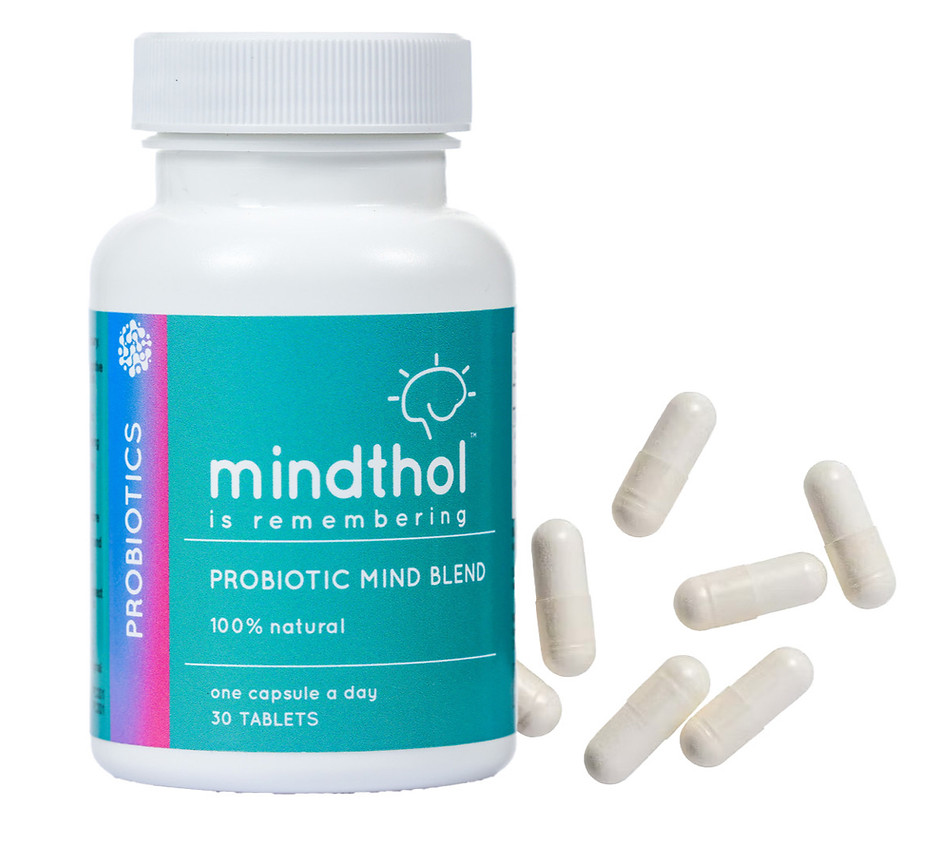Mindthol Probiotic Blend
Lactobacillus casei
Helps support a balanced gut environment, which can translate to better mood, sharper focus, and more consistent energy.
Lactobacillus acidophilus
Helps support a healthy intestinal barrier—so nutrients absorb better, energy stays steady, and you feel protected from the inside out.

Lactobacillus plantarum
is the natural reset button.
It supports smoother digestion, helps balance gut flora, and encourages nutrient absorption so your body runs like it’s meant to.
Bifidobacterium longum & Bifidobacterium infantis
help maintain a thriving gut ecosystem that supports long-term wellness, mental calm, and immune resilience.
Our premium probiotic formula that targets the gut–brain axis with the exact strains tested in Alzheimer’s research:
-
Lactobacillus casei – restores gut balance, fights oxidative stress
-
Lactobacillus acidophilus – supports digestion and neurotransmitter balance
-
Lactobacillus plantarum – proven to improve memory in animal and human studies
-
Bifidobacterium longum – protects against amyloid plaque buildup
-
Bifidobacterium infantis – enhances resilience to stress and improves cognition
The Protective Effects of Probiotics against Alzheimer’s Disease
Our intestines are inhabited by bacteria that break down the food we eat and release a wide variety of biochemicals. The biochemical communication between the gut and the brain plays an important role in normal brain functioning.
Dehydrated bacteria cultures that can be taken orally are known as Probiotics. Probiotics that contain certain bacteria species have been shown to reduce inflammation in the brain caused by Alzheimer’s disease.
Mindthol probiotics contain 10 different strains of bacteria and should be taken daily to maintain a healthy gut

Microbiota–gut–brain axis in neurodegenerative diseases: molecular mechanisms and therapeutic targets
Chen, C., Wang, Gq., Li, Dd. et al. Microbiota–gut–brain axis in neurodegenerative diseases: molecular mechanisms and therapeutic targets. Mol Biomed 6, 64 (2025). https://doi.org/10.1186/s43556-025-00307-1
Journal of Pre-Clinical and Clinical Research 2025, Vol 19, No 3, 130-136
The Role of Gut Microbiota in Pathogenesis of Alzheimer Disease
Karolina Barzyk1,A-D , Wiktoria Gołębiowska1, B,D , Natalia Gryta 1,B,D , Anna Brodowska 1,B,D , Magdalena Cieślik-Porębska 1,B,D , Maja Kondratowicz 1,B,D , Marcelina Kurek 1,E-F , Magdalena Chrościńska-Krawczyk 2,E-F 1 Student’s Scientific Association of Paediatric Neurology, Medical University, Lublin, Poland 2 Department of Pediatric Neurology, Medical University, Lublin, Poland A – Research concept and design, B – Collection and/or assembly of data, C – Data analysis and interpretation, D – Writing the article, E – Critical revision of the article, F – Final approval of the article
A Review on the Protective Effects of Probiotics against Alzheimer’s Disease
ibhuti Mishra 1,†, Dhananjay Yadav 2,† , Kavita Singh Solanki 3, Bhupendra Koul 4 and Minseok Song 2,*
1 School of Studies in Biochemistry, Jiwaji University, Gwalior 474003, India; vibhu.mishra2007@gmail.com
2 Department of Life Science, Yeungnam University, Gyeongsan 38541, Republic of Korea;
3 Department of Neuroscience and Pharmacology, Iowa Neuroscience Institute, University of Iowa,
Iowa City, IA 52242, USA; kavita-solanki@uiowa.edu
4 School of Bioengineering and Biosciences, Lovely Professional University, Phagwara 144411, India;
* Correspondence: minseok@yu.ac.kr
† These authors contributed equally to this work.